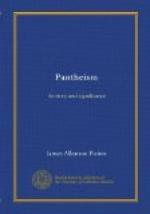[Sidenote: Empedocles, Middle of Fifth Century B.C.]
[Sidenote: Not Properly a Pantheist]
Having given so much space to an ancient who seems to me specially interesting as a prophet of the ultimate apotheosis of earthly religions, I must be content to indicate, in a very few lines, the course of the Pantheistic tradition among the Greeks after his day. The arithmetical mysticism of Pythagoras has no bearing upon our subject. Empedocles of Agrigentum, living about the middle of the fifth century B.C., and thus, perhaps, in the second generation after Xenophanes, was, in many respects, a much more imposing figure—clothed in purple, wielding political power, possessing medical skill, and even working miraculous cures, such as are apparently easy to men of personal impressiveness, sympathy, and “magnetism.” But he does not appear to have so nearly anticipated modern Pantheism as did his humbler predecessor. For though the fragments of Empedocles, much larger in volume than those of Xenophanes, certainly hint at some kind of everlasting oneness in things, and expressly tell us that there is no creation nor annihilation, but only perpetual changes of arrangement, yet they present other phases of thought, apparently irreconcileable with the doctrine that there is nothing other than God. Thus he teaches that there are four elements—earth, air, water and fire—out of which all things are generated. He also anticipates Lucretius in his pessimistic view of humanity’s lot; and insists on the apparently independent existence of a principle of discord or strife in the Universe. It would be a forced interpretation to suppose him to have set forth precociously the Darwinian theory of the struggle for life. For his notion seems much more akin to the Zoroastrian imagination of Ahriman. Again, he sings melodiously, but most unphilosophically, of a former golden age, in which the lion and the lamb would seem to have lain down together in peace;




